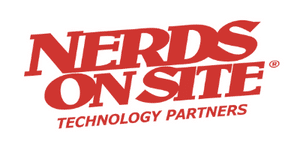As your company grows, there is no doubt you will need a dedicated IT professional to oversee and manage your technology. Efficient use of time and proper protection of company data are essential for success, so hiring the right IT personnel to keep things running trouble-free is critical.
Article Contents
A good IT professional doesn’t just fix a problem—they proactively monitor your technology to detect problems before they happen. Qualified and experienced IT personnel are in high demand, so attracting and retaining the very best can be a daunting task.
Fortunately, you can really help yourself out by knowing what you should be looking for. Keep reading to discover how to hire IT professionals for your business (and ensure you hire the right ones).
4 Questions To Consider When Hiring Professional IT Help For Your Business
- Timing: when is it the right time to bring on a dedicated IT professional?
- Needs: what are your current IT needs?
- IT qualifications: what should you look for when finding professional IT help?
- Type of service provider: should you hire in-house staff or a managed service provider?

1. When Should I Hire An IT Professional?
When is the right time to hire professional IT help? Some people like to wait until they reach specific milestones, such as when their company reaches a certain number of employees.
However, that shouldn’t be the only indication of need. You should hire professional IT help when the patchwork solution you have can no longer keep up with daily requirements.
Skilled IT pros are in high demand so it is best to act sooner rather than later. However, that doesn’t mean hiring the first applicant you come across.
How To Find Candidates
Networking is the best way to learn who’s out there and available to take on the job. Talk to people in your industry, attend industry conferences, and spend time on LinkedIn, Indeed and other employment sites to gauge what the job market is like. If you find a candidate you like and has all the skills you’re looking for, make them a fair offer.
Researching and setting a hiring strategy is necessary but time-consuming—you may want to consider hiring a recruitment firm to help you out. They have the resources and contacts to help you find what you need. Although it costs money, the investment will be repaid in the time you save by letting them sift through applications. Utilizing their expertise lets you stick to yours: running your business.
2. What Are My Current IT Needs?
When considering hiring an IT professional or team, take a careful look at what your specific needs are. Knowing what you need will ensure you get personnel with the necessary experience.
What You Should Consider
When determining your IT needs, consider:
- The complexity of your systems and the skill set required to manage them
- If you are expanding your business, such as hiring new employees and/or opening new locations
- Projects you have coming up and if you’re looking to add redundancy to your critical servers and applications
Look for an IT professional who is experienced in the specific areas you need help with. For example, If you’re looking to enhance network security, you will need an IT pro with experience in DNS-based security solutions. Alternatively, if you’re looking for hosted email solutions, you will need someone with experience administering solutions like Google’s G-Suite or Microsoft’s Hosted Exchange / 0365.
Don’t forget to look beyond your needs of today and determine what kind of support you will require to succeed in future years. Planning for the future will save a lot of headaches down the road.
3. What Should I Look For When Finding Professional IT Help?
A Bachelor’s in Computer Science or a degree in Management Information Systems can put graduates on solid footing in the IT industry. In addition, there are some very good two-year technical college diplomas that provide a good, general IT education.
However, these degrees and diplomas may not be a necessary component when looking to hire IT professionals. Taking these degree or certificate programs is certainly not a waste of time— but these days, experience is more sought after when hiring an IT professional.
There was a time when College or University was considered a requirement for a meaningful, rewarding career. But times have changed and the IT industry keeps changing at an incredible rate.
Doug Garrard, the Sr. Field Services Manager, Eastern Canada Critical Power and Cooling for Schneider Electric, has extensive experience in hiring IT professionals. “When it comes to education vs. experience in an IT professional, I tend to weight things pretty heavily towards experience.”
Although Garrard thinks education is an asset, he believes that real-world experience is more valuable. “I need people who can think on their feet, act with urgency and adapt and react quickly. That comes with experience.”
Make Sure It’s The Right Experience
How do you know if a candidate has the experience you are looking for? Although skills may look good on paper, consider setting up an additional part of the application that applies those skills.
For example, you could ask an applicant to configure a computer workstation from scratch, install and configure software, implement security protocols, and install a router. Look beyond those who simply perform the tasks to the people who come back with questions and suggestions.
In addition to technical know-how, soft skills are just as important. If an individual lacks communication skills, the technical skills don’t amount to much. Look for someone who is outgoing, confident, a critical thinker, a problem-solver, and a leader eager to grab the reins when a new project comes up.
Ask Questions
There are some areas where a practical test can’t give you all the information you need. Asking specific questions is important when determining if someone is the right fit. Some questions to ask include:
- What is your process for handling internal tech requests?
- What is your availability? Are you able to respond during the evenings and weekends?
- What is your experience with data backup and recovery?
- How do you keep up with industry standards?
- How will you improve and maintain our technology’s security?
Don’t be afraid to ask plenty of questions to make sure you are covering all of your bases.

4. Should I Hire In-House Staff Or A Managed Service Provider?
This is an interesting question that sparks much debate—there are definitely arguments for both sides. Whatever decision you make will have direct implications on cost and service levels, so it is best to fully understand the difference between the two.
Cost Differences
Experienced, full-time IT professionals are in high demand, therefore they can ask for even higher salaries. Depending on experience, the expected salaries can vary:
A Computer/Network Support Technician (at the lower end of the abilities scale) earns around $43,501.00 annually, or about $21/hr.
A Network Administrator (somewhat more experienced) earns roughly $53,666.00 a year or about $26/hr.
These are by no means insignificant numbers to a small or medium size enterprise. But the investment can be worth it if they can provide the technical know-how to keep things running smoothly and leadership skills to improve processes.
A Managed Services Provider (MSP) on the other hand, can cost as little as $13/hr, depending on the size of the client company. With an MSP, you don’t have employee carrying costs (such as pensions, paid holidays, benefits, or sick days), additional charges for remote monitoring, or hardware and software replacement costs.
An added benefit of an outsourced team is they only get paid while they work, which can scale incrementally while your company grows—you only pay for what you need. A new in-house hire may incur costs with big leaps in salary. However, cost is only one factor in deciding between an in-house IT team or a Managed Service Provider.
Considerations Beyond Cost
Some companies feel that an in-house IT staff gives them more control over their technical operations. They have the time to develop a deep understanding of the company’s infrastructure, immediate needs, and internal politics. These individuals can respond immediately to problems that arise. Some companies also have extremely complex systems that may take time to learn and need the attention of a full-time staff.
Hiring an in-house person runs the risk of getting someone too inexperienced to do complex tasks or too experienced to want to do the grunt work. On the other hand, an MSP gives you access to a larger team of people, ensuring there are always enough people to handle day-to-day operations and move ahead on other projects. You get a range of expertise from entry level to CTO.
A good MSP will have every skill set you need and will work proactively to prevent problems before they happen. This reduces downtime and keeps your business running smoothly. Plus, an MSP has the buying power to access the very best tools because they manage thousands of workstations, not just the 25, 50 or 100 you may have.
In terms of remote support, an MSP can provide better support than a head-office IT department, particularly if you have multiple locations. They will have a dedicated remote support team and a dedicated field team.
It’s Possible To Have Both!
A combination of in-house and outsourced help could provide the level of support and cost efficiency that you need. The internal team can handle the systems and day-to-day operations while an external team supplements their skills and proactively monitors their technology. This framework allows you to scale support as needed, as not all skills are necessary all of the time.
Make An Informed Choice When Hiring Your IT Professional
There are many things to consider when hiring IT staff for your expanding enterprise. It is one of the most important decisions you will make for your business, so it is worth knowing how to evaluate your options. Education is the first step in ensuring you make an informed choice when hiring your IT professional.
Your business’ success relies on operations running smoothly—the right IT professional can help keep tech-related headaches and interruptions at bay. Contact us today for help assessing your needs and exploring potential IT solutions.













